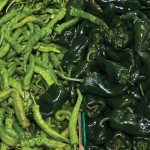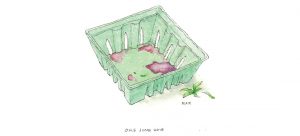
Letting Go
Until then, hang on to dear, sweet life
By Jim Dodson
On a glorious end-of-spring afternoon, my friend Keith Bowman took me to see his farm, 15 miles southeast of town, a forested tract of land to which he has devoted the last 35 years so as to turn it into a peaceable kingdom for people who love nature.
We met when I wrote about Keith and three college buddies who’ve attended every Masters Tournament together since 1960, a friendship still going strong 60 years later. During our conversations about Augusta National, Keith let on that he once took a sprig of the famous Augusta azaleas hoping to root and grow the same plant here in North Carolina on his farm where he and a cousin cultivated more than 600 azaleas and rhododendron.
When he learned I was an addicted gardener, he invited me to ride out someday and see his “garden that’s gone a little wild.”
Before that, however, was the matter of an old tree.
“There it is,” he said, pulling to the side on a quiet lane that turned off the Company Mill Road. “What do you think of that?”
The tree was an ancient poplar, rising from a small forested vale below the road bed, massive and very mystical-looking, knotted and gnarly as a giant’s index finger rising to a deep blue sky, at least 13 feet or so in circumference. The monster looked like something out of a children’s story, the home of a Druid king or hermit wizard.
“One day when I was about 13, my father brought me here to see this tree and told me how his grandfather hid in it to avoid being conscripted by the Confederate army.” On his next birthday, Keith Bowman will be 85. “The tree was probably close to 100 years old back then.”
“What amazes me is how it has survived everything from rough weather to changes here in the countryside,” said Keith. “Its top was sheared off long ago but it’s still putting out limbs and leaves. It just won’t let go, comes back year after year.”
Keith’s farm, which is named Ironwood and sits near the village of Climax, was pretty amazing in its own right. Though there are fields he leases to neighbors for raising crops, most of the 120-acre property is covered by a gorgeous forest of hardwoods. There is a handsome unpainted farmhouse and a large barn well off the road, both of which suffered significant damage from the great ice storm of 2014, when large trees toppled onto their roofs. Other trees fell onto the spectacular octagonal gazebo built by Keith and his late father, Ross, beside the acre-and-a-half pond Keith had built at the heart of his earthly paradise.
The gazebo and pond were designed for swimming and fishing. The structure features hand-cut wooden shingles from the mountains and is bunkered by the aforementioned red and white azaleas.
“Because of the ice storms, the place doesn’t look as nice as it used to,” Keith needlessly apologized. “But this has certainly been a source of a lot of joy to me, friends and neighbors,” he allowed as we walked through the woods to see the remains of a large nursery where rhododendron and large azaleas were returning to a wild state.
In the farm’s glory days, Keith invited school groups and neighbors from nearby Climax to use the property for “a getaway in nature,” and once threw a party for neighbors from the crossroads with barbecue and a bluegrass band.
Ironwood visitors fished, had picnics, hiked and swam. There is even a fancy paneled outhouse with a cathedral roof, skylight, electric lights, running water and a chandelier. “It’s kind of the Cadillac of outhouses,” Keith joked.
Across the pond, he installed an orchard with 81 fruit trees and a large grape arbor of Concord, scuppernong and muscadine varieties. “For years I had so much fruit I couldn’t give it away,” he told me as we strolled around the pond.
It was late in the day and the surrounding woods were stirring with life, full of birdsong. The light was almost ethereal, the serenity complete in the seclusion of Keith Bowman’s Peaceable Kingdom.
“You wouldn’t believe all the wildlife around us,” he was moved to say as we walked, pausing to marvel as a trio of honking Canada geese zoomed over the pond and our heads, heading north with spring. “That’s why it means so much to me to keep this place the way it is — to pass it along to someone who will properly care for it and allow others to use it for relaxation and spiritual renewal.”
As a kid, Keith dreamed of becoming a test pilot, and nearly achieved that dream by training as a fighter pilot during the Cold War. After that, he worked as an engineer on the Nike missile for Western Electric in Burlington. A long career with the Small Business Administration followed — he was in charge of both Carolinas for a time — introducing him to good friends he keeps up with to this day. For a decade, he performed with a traveling gospel group. Though he never married (“a couple of near-misses,” he says with a wistful laugh, “that just didn’t work out”), he has enjoyed a full life of faith and friendship, belonging to several different churches.
It’s the uncertain fate of Ironwood that chews at him. Since the death of a neighbor who did most of the heavy maintenance work on the property, Keith can’t possibly keep up with all that needs to be done.
“I don’t have any relations left to give it to,” he admitted, as we started back to his car. “That’s a problem I think a lot of older Americans face these days. As we get older out in the country, younger folks aren’t replacing us. They want to live in the city. You can’t blame them. But connections will be lost.”
For this reason, Keith has spent decades photographing nature and creating documents to show what was done, filling several meticulously organized scrapbooks.
When I suggested that he might consider giving the farm to a local church for a retreat or youth camp, given his strong connections to local congregations, he smiled and shook his head. “I know people who have done just that. Most churches would sell the property for other purposes.”
On the drive back to town, he showed me the historic Tabernacle Methodist Church, where generations of his family are buried. The interior of the church was a handmade gem. Keith has photographed all of its stained-glass windows.
“I think about a line I heard from the film Life of Pi,” he mused as we drove back into town. “All of life seems to be about letting go of things you love. Truthfully, I’m the worst person in the world at letting things go,” he said with a laugh. “But you’ve got to eventually let it go. I know that.”
Keith and his personal nature preserve were still on my mind a few days later when I phoned my friend Joe who is an experienced forester who helps people just like Keith figure out what to do with their land when the time arrives to let it go. Joe, as I knew he would, agreed to give his perspective and advice.
I even looked up the quote from Life of Pi, which goes, “I suppose in the end, the whole of life becomes an act of letting go, but what always hurts the most is not taking a moment to say goodbye.”
Keith, at least, is taking his own sweet time to say goodbye.
Out in my half-finished Japanese garden, meanwhile, which has shown great improvement over the course of a cool and rainy spring, I couldn’t help but think about the things of this world I treasure but will someday have to let go.
As it happened, I was planting a pair of Red Slipper azaleas and a Christmas fern mixed with the ashes of the three well-loved golden retrievers that brought our family incalculable joy over the years. My garden will be the final resting places for dear old Amos, Bailey and Riley the Rooster, as we called him — and, with a little luck, perhaps the head gardener as well.
A rusted iron sign that stood forever in the peonies of my late mother’s garden read: Dig in the soil, delve in the soul. No place better than one’s garden to do that. Thomas Jefferson always made lists that he kept in his back pocket, especially when in his garden.
Keith and his farm were still on my mind, and I couldn’t help but make my own mental list of the people and things of this world I shall someday have to let go.
Naturally, my adorable wife and four great kids top the list — though with luck they’ll have to let go of me first.
As I dug, my simple list grew: my dog Mulligan, old friends, golf with buddies, quiet time in my garden, a house that finally feels like home, early church, arboretums, old hymns, my wife’s caramel cake, histories and spy novels, birds at the feeder, the glory of spring, the spice of autumn, the silence of snowy nights, film scores, dawn walks, rainy Sundays, supper on the porch, the blue of dusk, garden catalogs, my new rubber boots, my old guitar, blue limericks, roses in June, freshly baked bread, driving back roads, all of Scotland, half of England, the poems of Billy Collins and Mary Oliver, and a few other things I shall surely miss and think of later.
Leave it to Mary Oliver to offer the best advice to Keith and me and others like us.
“To live in this world,” she said, “you must be able to do three things. To love what is mortal and hold it against your bones knowing your own life depends on it; and then, when the time comes to let it go, to let it go.” OH
Contact Editor Jim Dodson at jim@thepilot.com.





